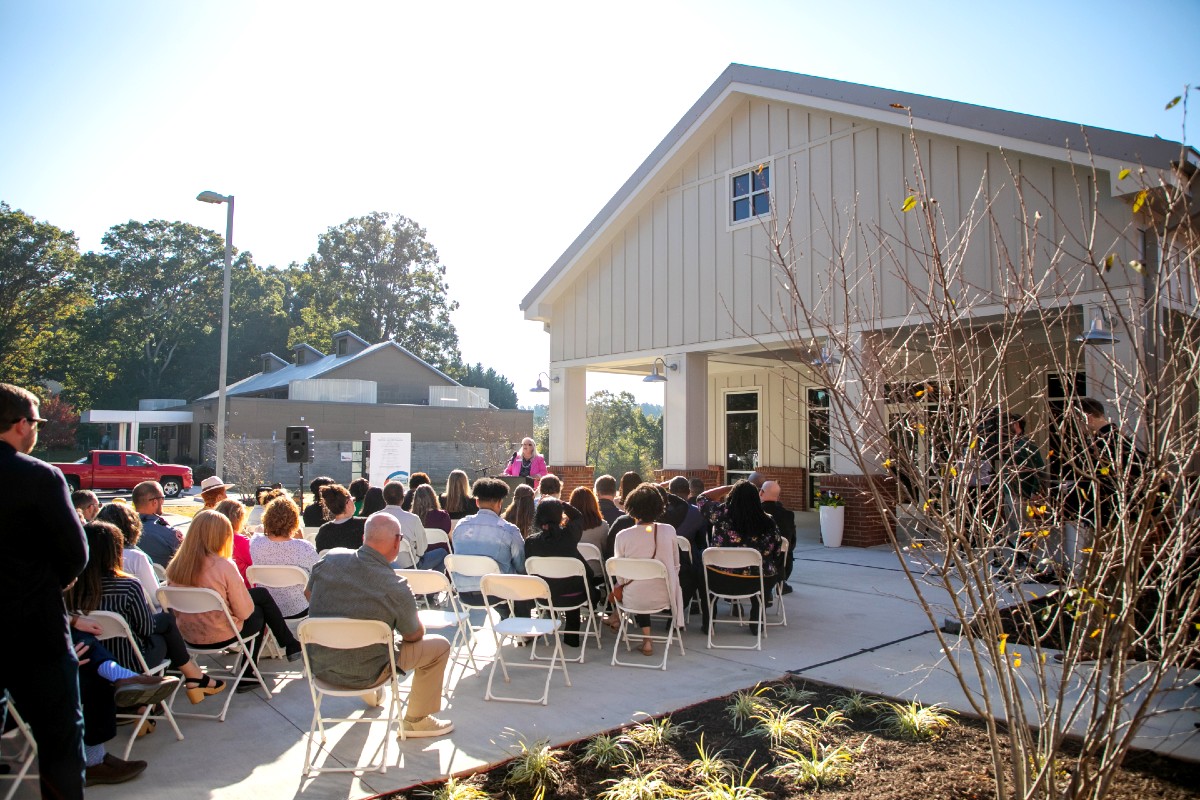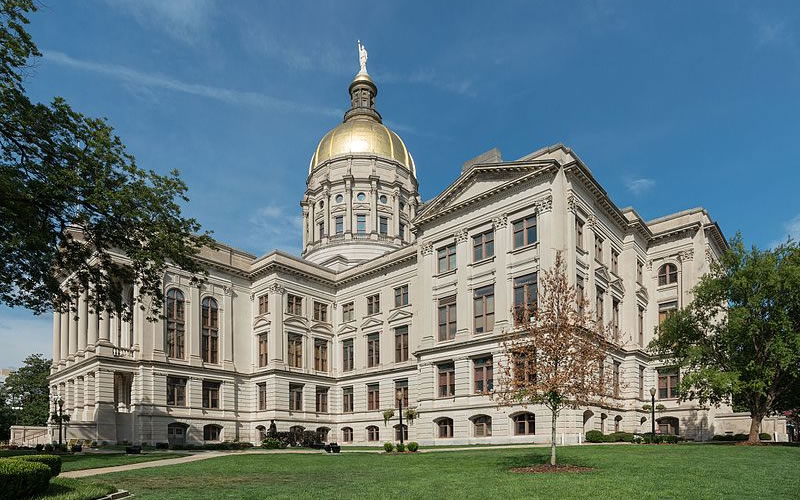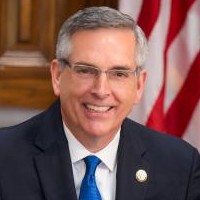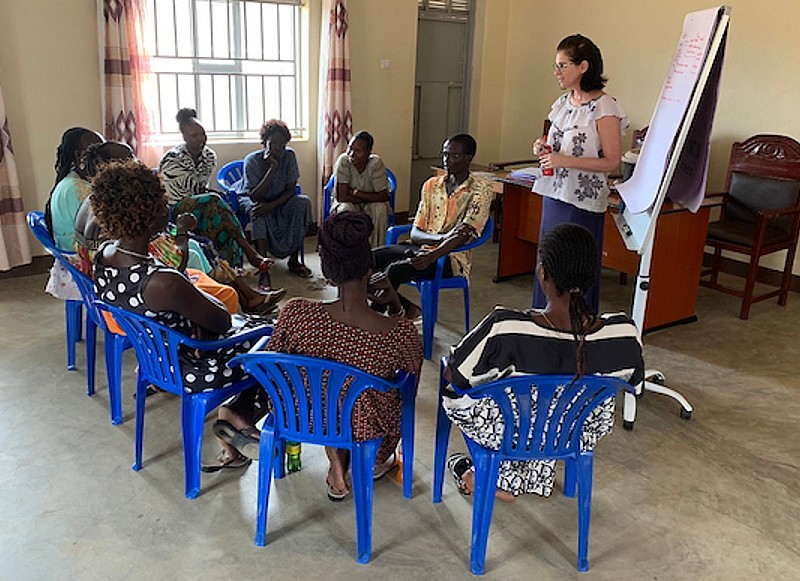GwinnettForum | Number 23.85 | Oct. 29, 2024
ONESTOP RIBBONING: County officials cut the ribbon for the newly expanded OneStop Centerville in southern Gwinnett on Thursday, enhancing access to services and resources for residents in the area of the county. Tina Fleming, community services director, is shown speaking. Located beside the Centerville Senior Center, the expanded facility offers a variety of community spaces for events, workshops, classes and other activities. The 33,000-square-foot, two-story facility includes an 11,000-square-foot playground and houses office space for county partners, including GNR Public Health and View Point Health. These partnerships will enable the delivery of crucial programs in public health, early learning, mental health and family services. Gwinnett County used $25 million from the federal American Rescue Plan Act to fund the project. To learn more about OneStop Centerville, visit GwinnettOneStop.com.
TODAY’S FOCUS: Standing up to pressure to keep elections honest
EEB PERSPECTIVE: Sound institutions, good leadership, develop prosperity
SPOTLIGHT: E.R. Snell Contractor, Inc.
FEEDBACK: A million died from Trump’s pandemic ineptness
UPCOMING: Suwanee wins second annual food fight vs. Sugar Hill
NOTABLE: GGC lecturer returns from Fulbright in Uganda
GEORGIA TIDBIT: Jam band Widespread Panic out of the mid-1980s
MYSTERY PHOTO: Clouds surround this seaside mansion
CALENDAR: America Recycles Day is Saturday, Nov. 2
Standing up to pressure to keep elections honest
By Andy Brack, publisher
Charleston (S.C.) City Paper
PEACHTREE CORNERS, Ga. | It’s the second day of a new year just after a presidential election and you pick up the phone. At one point, the guy on the other end of the line says, “All I want to do is this: I just want to find 11,780 votes , which is one more that we have because we won the state.”
 The guy on that Jan. 2, 2021, was the president of the United States, Donald Trump. He was putting pressure on Georgia’s top election official, Republican Secretary of State Brad Raffensperger, to “find” enough votes to prevail in the Peach State over Democratic candidate Joe Biden. Trump even threatened a criminal prosecution.
The guy on that Jan. 2, 2021, was the president of the United States, Donald Trump. He was putting pressure on Georgia’s top election official, Republican Secretary of State Brad Raffensperger, to “find” enough votes to prevail in the Peach State over Democratic candidate Joe Biden. Trump even threatened a criminal prosecution.
The whole mess put Raffensperger in a very uncomfortable spot because he wanted to do his job – reporting votes accurately and reporting the numbers for what they were, without deceit, subterfuge or obfuscation.
“I’m an engineer. I’m real good with math,” Raffensperger said last week in an interview outside of Atlanta. “So with elections, there’s no integrals, no double integrals, no Laplace transform of a Fourier wave series. It’s just adding up numbers. We don’t even have to subtract, divide or multiply – so that’s grade school (math). But we have a process in place and we know that our elections are safe, they’re secure and they’re accurate.”
Still, the pressure from the Trump White House – attempted coercion that ended up getting Trump in trouble with Georgia prosecutors and was part of an article of impeachment in the U.S. House – was intense.
“It was an interesting moment, somewhat surreal,” Raffensperger reflected. “We never expected this to happen. But I think sometimes you know things happen for a reason, but you are called to do your job – no matter what. And that’s what I wanted to do. And I also wanted to make sure that I was respectful to the office of the President of the United States of America.
“Because I think really what we see right now … throughout the world is people should be respectful of people who hold positions of authority.”
And he said he believes that’s what is at stake these days in America. “People should talk to each other respectfully,” he said. “I think when we lose that, I think we’re losing something within ourselves.
“We can have strong conversations and just say, by George, I disagree with you on that, but we don’t have to pull out our swords. We don’t have to pull out our muskets. We don’t have to have duels. We can settle that. We are in America. We are in a representative republic.”
Since the 2020 election, Georgia election officials have worked to improve the voting process and smooth a few past snafus.
Raffensperger said he expects results comparatively quickly this year because Georgians seem to like early voting. While about 5% of ballots are expected to be mailed absentee ballots, more than two million Georgians have already cast early ballots. By election day, some 70% of the electorate is expected to have voted, which will take a lot of last-minute pressure off voting precincts. The fate of the state’s electoral votes – unless the election is within 1,000 votes or so – may be known by midnight, he said.
As you listen to returns on election night, think about all of the Brad Raffenspergers out there who operate with integrity and know that voting in America is solid because it is done with a proven process, not with reckless abandon.
- Have a comment? Click here to send an email.
Sound institutions, good leadership, develop prosperity
By Elliott Brack
Editor and Publisher, GwinnettForum
OCT. 29, 2024 | Sometimes, the obvious stares you in the face and you cannot see the obvious.
![]() That’s our thinking about the recent awarding of a Nobel prize in economic sciences. The award went to three researchers, two at the Massachusetts Institute of Technology, and one at the University of Chicago. The prize in economic sciences is awarded by the Royal Academy of Sciences, Stockholm, Sweden, according to the same principles as for the Nobel Prizes that have been awarded since 1901.
That’s our thinking about the recent awarding of a Nobel prize in economic sciences. The award went to three researchers, two at the Massachusetts Institute of Technology, and one at the University of Chicago. The prize in economic sciences is awarded by the Royal Academy of Sciences, Stockholm, Sweden, according to the same principles as for the Nobel Prizes that have been awarded since 1901.
Sveriges Riksbank (Sweden’s central bank) established the Sveriges Riksbank Prize in 1968 on the occasion of the bank’s 300th anniversary and pays the award in Economic Sciences in memory of Alfred Nobel.
In 2024, the awards were given to Daron Acemoglu and Simon Johnson, at MIT, and to James A. Robinson, University of Chicago “for studies of how institutions are formed and affect prosperity.” They developed the numbers behind the proven experience that government protection of ordinary people is good for economic growth. Their research explains why “[s]ocieties with a poor rule of law and institutions that exploit the population do not generate growth or change for the better,” while democracies do.
We quote from the press release from Sweden:
They “demonstrated the importance of societal institutions for a country’s prosperity. Societies with a poor rule of law and institutions that exploit the population do not generate growth or change for the better. The laureates’ research helps us understand why.
“When Europeans colonized large parts of the globe, the institutions in those societies changed. This was sometimes dramatic, but did not occur in the same way everywhere. In some places the aim was to exploit the indigenous population and extract resources for the colonizers’ benefit. In others, the colonizers formed inclusive political and economic systems for the long-term benefit of European migrants.
“The laureates have shown that one explanation for differences in countries’ prosperity is the societal institutions that were introduced during colonization. Inclusive institutions were often introduced in countries that were poor when they were colonized, over time resulting in a generally prosperous population.
“Some countries become trapped in a situation with extractive institutions and low economic growth. The introduction of inclusive institutions would create long-term benefits for everyone, but extractive institutions provide short-term gains for the people in power. As long as the political system guarantees they will remain in control, no one will trust their promises of future economic reforms. According to the laureates, this is why no improvement occurs.
“However, this inability to make credible promises of positive change can also explain why democratization sometimes occurs. When there is a threat of revolution, the people in power face a dilemma. They would prefer to remain in power and try to placate the masses by promising economic reforms, but the population are unlikely to believe that they will not return to the old system as soon as the situation settles down. In the end, the only option may be to transfer power and establish democracy.”
Jakob Svensson, chair of the Committee for the Prize in Economic Sciences, says: “Reducing the vast differences in income between countries is one of our time’s greatest challenges. The laureates have demonstrated the importance of societal institutions for achieving this.”
These three professors thought they recognized an obvious point. By building models, and delving into history, they proved the obvious: forming institutions with good leadership will see a country prosper.
- Have a comment? Click here to send an email.
E.R. Snell Contractor, Inc.
 The public spiritedness of our sponsors allows us to bring GwinnettForum.com to you at no cost to readers. Today’s sponsor is E.R. Snell Contractor, Inc. of Snellville. Founded in 1923, E.R. Snell is a local, family-owned construction and infrastructure company dedicated to delivering excellence in every road and bridge they undertake. Their rich history has established them as a trusted name in the industry, renowned for their bedrock commitments to safety, quality, and customer satisfaction. ERS is excited to have reached this momentous milestone of 100 years in business and looks to the future and the next ten decades as they build the road ahead.
The public spiritedness of our sponsors allows us to bring GwinnettForum.com to you at no cost to readers. Today’s sponsor is E.R. Snell Contractor, Inc. of Snellville. Founded in 1923, E.R. Snell is a local, family-owned construction and infrastructure company dedicated to delivering excellence in every road and bridge they undertake. Their rich history has established them as a trusted name in the industry, renowned for their bedrock commitments to safety, quality, and customer satisfaction. ERS is excited to have reached this momentous milestone of 100 years in business and looks to the future and the next ten decades as they build the road ahead.
- Visit online at www.ersnell.com
- For a list of other sponsors of this forum, click here.
A million died from Trump’s pandemic ineptness
Editor, the Forum:
![]() I’m amazed how people seem to forget the million-plus people who died during Trump’s term in office. I guess they don’t realize the scope of the pandemic. Maybe it didn’t touch their lives. But you have to be a little concerned when there is no defense against a disease that doesn’t care if you are red or blue or in between.
I’m amazed how people seem to forget the million-plus people who died during Trump’s term in office. I guess they don’t realize the scope of the pandemic. Maybe it didn’t touch their lives. But you have to be a little concerned when there is no defense against a disease that doesn’t care if you are red or blue or in between.
I believe if Trump had shown some leadership and listened to his advisors, at least half the people who died would still be here. If he followed the pandemic guidelines the Obama Administration had put out before his taking office, again, we would be in better shape, both health-wise and financial-wise.
I also want to harp on the fact Trump only built a very small portion of the border wall and guess what folks? Mexico didn’t contribute a red dime. And I also want to emphasize that he separated children from their parents of those who did get across our borders. Melania’s coat said it all, “I don’t care, Do U?” when she visited a migrant encampment (a nicer word than concentration camp).
The list and hits go on and I would be happy to list them all if I was allowed more than 300 words. I didn’t benefit from his one term in office, and I really dread another. Those who think he did a “great” job are only deluding yourselves into the “fairy-tale of Trump.”
One last thing: I know Joe Biden is still president, and Kamala Harris is still vice-president. Two different jobs. Hers is to serve her president, break any tie in the Senate, and be ready to take over if something should happen to the president. Mike Pence, who held the office of vice president, had the same job title during the Trump administration. Learn your history and take a civics course.
– Sara Rawlins, Lawrenceville
Vote for transit referendum is a win for everyone
Editor, the Forum:
Lovely editorial about the importance of voting for transit. When I was a kid, my mom took MARTA everyday to her job at Sears on Ponce de Leon. We all used it to get to doctor’s appointments and traveling around Atlanta. We were happy to have the option of going anywhere we needed to. It’s a win for everyone.
Then later on, I realized that Tucker Carlson is the worst.
I saw that clip of the spanking thing. Unbelievable. No one spanks their kids anymore—that has been banned for years as abusive. So, besides his other horrible comments, I guess that he is endorsing spanking.
I’m sick of them portraying themselves as “Christians.” All I know is that Jesus was a liberal.
– Alana Moss, Duluth
Thinks 30 years of tax might have scared voters
Editor, the Forum:
I think the 30-year mention in the (Gwinnett) voter question tended to scare voters off, as it instilled fears of the authority becoming deaf regarding their operations, and eventually going down the road of MARTA leadership.
— Ron Baker, Stone Mountain
Dear Ron: We’ll see, but hope not. Heavy upfront expenditures require it. And it’ll save people from paying added property taxes.—eeb
Transit sales tax is a lesser burden than Uber rides
Editor, the Forum:
About the transit referendum: it’d help if you could provide some supporting numbers to show costs for the benefit. I worry for those of our citizens living hand to mouth and in greatest need, this will be a benefit but also a new added burden they don’t currently have. It seems the county would lead with the numbers if the numbers supported the expense. Also guessing outsiders paying sales tax only would be a fraction of what residents will pay. Not seeing a direct rollback of property taxes is also a concern.
Thanks for shining the light on this!
– Rob Blatecky, Buford
Dear Rob: You are right. Here’s the basic fact: The general fund of the county contributes $18,500,000 to the transit fund each year. That means if we had the extra penny from the sales tax referendum, we could spend $18,500,000 on some other service, and eliminate that item from the general fund. Rollback doesn’t apply here, unless you recognize that paying an added penny means you won’t pay property tax for transit. –eeb
Found perspective on transit helpful and informative
Editor, the Forum:
The perspective comment in GwinnettForum last Friday on the one percent SPLOST additional sales tax on transit, or paying higher property taxes for Gwinnett County individuals and businesses, was very helpful and quite informative.
– Michael Garry. Lilburn
Send us your thoughts: We encourage you to send us your letters and thoughts on issues raised in GwinnettForum. Please limit comments to 300 words, and include your hometown. The views of letters are the opinion of the contributor. We reserve the right to edit for clarity and length. Send feedback and letters to: ebrack2@gmail.com.
Suwanee wins 2nd annual food fight vs. Sugar Hill
 The City of Suwanee has emerged victorious over Sugar Hill in the second annual friendly “Community Food Fight.” This friendly competition pits the two cities against each other to see who can gather the most donations to support the North Gwinnett Co-Op, which provides vital services to the communities of Suwanee, Sugar Hill, and Buford.
The City of Suwanee has emerged victorious over Sugar Hill in the second annual friendly “Community Food Fight.” This friendly competition pits the two cities against each other to see who can gather the most donations to support the North Gwinnett Co-Op, which provides vital services to the communities of Suwanee, Sugar Hill, and Buford.
Building on the success of the 2023 inaugural Food Fight, when Sugar Hill took home the trophy, together in 2024, Suwanee and Sugar Hill’s efforts raised an impressive 17,139 pounds of food and $3,680 in support, demonstrating the power of community solidarity.
While Suwanee celebrates taking home the trophy, this year’s Food Fight is a victory for the entire community. Mayor Jimmy Burnette says: “Everyone who dropped off donations, contributed online, or helped us spread the word made a real difference!”
GGC lecturer returns from Fulbright in Uganda
Dr. MaryBeth Chrostowsky, is back in her Georgia Gwinnett College (GGC) classroom this semester after spending a year in the African nation of Uganda under a prestigious Fulbright Scholar Award.
A senior lecturer in anthropology, Chrostowsky spent the year working with graduate students in the Refugee and Migrant Studies Program at Ugandan Martyrs University in Kampala.”
Chrostowsky split her work weeks in Uganda between teaching and doing fieldwork. She lived on campus in a guesthouse, so her office was near her classroom. She shared her office with other professors, which she enjoyed because they would take walks together some evenings.
One of the biggest challenges was the lack of reliable power and Internet. “It was common for the power to go out. The campus had a generator, but sometimes it would take time for it to turn on, or was out of gas. Even when the Internet was working, the network was weak, making doing a simple Google search or sending an email painfully frustrating, but I adapted to that reality.”
Chrostowsky says reliable Internet and a daily hot shower were probably the things she missed most, but otherwise, a typical day teaching in Uganda was not so different than a day teaching in the U.S.
Her days doing fieldwork were another thing entirely. She conducted her research in the West Nile region of Uganda and used the public bus system to get there. She says most of the buses were old with uncomfortable seats, and the passengers were stuffed into them like sardines with no air conditioning.
What surprised her most was the degree of difference between the U.S. and Ugandan higher education systems. “I understood and expected formal education to vary worldwide because it is informed by cultural practices, values and beliefs, but I did not expect the degree of difference I encountered,” she says.
One big difference was the age of her graduate students because most Ugandans do not have the privilege of going to graduate school immediately after attaining their bachelor’s degree. Due to cultural and social pressure to get married and have children, they wait many years before attending graduate school.
Another difference is that there are no government student loans available in Uganda like there are in the U.S.
“Because of their duties to their families, maybe even to their parents, it takes time to save up for the tuition,” says Chrostowsky. “Uganda is a developing nation, so attending university or grad school is extraordinary. It often takes multiple family members to raise the money needed for school fees.”
Chrostowsky is happy to say she accomplished her three main goals during her residency:
- As a course instructor, sharing her knowledge of U.S. refugee law and the everyday challenges refugees face once they arrive in the U.S.
- Carrying out her research project to examine how kinship functions as a resource for displaced people from the Dinka tribe.
- Creating working relationships with Ugandan scholars.
She says her most significant win was the mentorship she provided to her students – proudly noting she is now the chair for one of her Ugandan student’s master’s research thesis – and her biggest takeaway from the year is that, “We are always learning. Even when we think we understand it all, we don’t.”
Back at GGC, she is sharing her experiences with her students.
“This experience abroad will make you a stronger teacher, researcher and mentor. I wish it for everyone.”
An invitation
What books, restaurants, movies or web sites have you enjoyed recently? Send us your recent selection, along with a short paragraph (150 words) as to why you liked this, plus what you plan to visit or read next. Click here to send an email.
Jam band Widespread Panic out of the mid-1980s
The hard-working, down-to-earth jam band Widespread Panic came out of the Athens music scene’s second wave of talent, which began forming in the mid-1980s. With their fusion of southern rock, jazz, and blues, Widespread Panic has earned renown as one of America’s best live bands.
 The band got its start in 1982 when University of Georgia students John Bell and Mike Houser began collaborating on music. Vocalist Bell and guitarist Houser soon added bassist Dave Schools to their ranks, forming the band’s name from Houser’s nickname, “Panic.”
The band got its start in 1982 when University of Georgia students John Bell and Mike Houser began collaborating on music. Vocalist Bell and guitarist Houser soon added bassist Dave Schools to their ranks, forming the band’s name from Houser’s nickname, “Panic.”
In the mid-1980s the band began weekly jam sessions at Athens’s Uptown Lounge and became known for putting in more time on stage than most bands, sometimes up to four hours at once. The band performed as a trio for a time, recording their debut single “Coconut Image” in 1986. Later Drummer Todd Nance, percussionist Domingo “Sunny” Ortiz, and keyboardist John “JoJo” Hermann joined the band. The line-up stayed the same until Houser’s death from cancer in August 2002. In 2016 Nance departed the band and was replaced by Duane Tracks.
Widespread Panic released its debut album Space Wrangler in 1988 and took to the road, beginning the extensive touring for which the band is known. The group’s second album, Widespread Panic, was issued in 1991 by Capricorn Records. They expanded their fan base by appearing at the touring rock music festival H.O.R.D.E. in 1992 and 1993. The band released Everyday in 1993 and Ain’t Life Grand in 1994, which produced the hits “Airplane” and “Can’t Get High.” After the release of the latter album, the group took a three-year reprieve, during which time they worked and toured with fellow Athens musician Vic Chesnutt.
Following their 1997 album, Bombs and Butterflies, they released their first-ever live album, Light Fuse, Get Away (1998), for which they held a free, open-air release party in downtown Athens in April 1998. The massive event once held the world record for the largest album release party at an estimated 100,000 attendees. The band also set a record for attendance at the New Orleans Jazz Festival in 1999, drawing 63,000 fans. Since then the band has released Another Joyous Occasion (2000), Don’t Tell the Band (2001), Live in the Classic City (2002), Ball (2003), Earth to America (2006), Free Somehow (2008), Dirty Side Down (2010), Street Dogs (2015), Miss Kitty’s Lounge (2022), and Snake Oil King (2024).
The band has made Pollstar’s “Concert Pulse” chart of the top fifty bands on the road numerous times and they have been known to perform more than 150 live dates a year. Widespread Panic was inducted into the Georgia Music Hall of Fame in 2008. For all its success, the band has emphasized excellent musicianship and accessibility to fans, making them one of the most durable and beloved touring acts nationwide.
- To view the Georgia Encyclopedia article online, go to https://www.georgiaencyclopedia.org
Clouds surround this seaside mansion
Clouds, mountains, the water and a mansion. Can you identify this issue’s Mystery Photo? Do your investigation, then send your results to ebrack2@gmail.com and include your hometown!
 In the last issue, the mystery was Holland Harbor Lighthouse, nicknamed “The Big Red Lighthouse” located in Holland State Park at the entrance to Lake Macatawa from Lake Michigan. Margaret Halbert of Roswell, a native Michigander, told us: “I have a print of this lighthouse in my home office!” But who sent it in? GwinnettForum lost the name. Please let us know.
In the last issue, the mystery was Holland Harbor Lighthouse, nicknamed “The Big Red Lighthouse” located in Holland State Park at the entrance to Lake Macatawa from Lake Michigan. Margaret Halbert of Roswell, a native Michigander, told us: “I have a print of this lighthouse in my home office!” But who sent it in? GwinnettForum lost the name. Please let us know.
Others recognizing it included Jay Altman, Columbia, S.C.; George Graf, Palmyra, Va.; Virginia Klaer, Duluth; Elaine Still, Braselton; Susan McBrayer, Sugar Hill; Stewart Ogilvie of Rehobeth, Ala. and Allan Peel of San Antonio, Tex., who added: “This was the third light built at this location and is Michigan’s most photographed lighthouse. The first gas light was built at this site in 1872 at the bequest of early Dutch settlers who had long been petitioning the U.S. government to light a path to and from what was then called Lake Black (now Lake Macatawa).
“This first structure was a small, square, wooden structure that stood on an open platform on legs above the deck of the pier. Needless to say, this simple building took a beating from the weather over the years, so by the turn of the 20th century it was enhanced with the addition of a gas light atop a more robust, steel tower. In 1907 the present lighthouse was built and equipped with a fog signal, since the light on the steel tower was not visible during heavy fog. The current structure did not receive a light until 1932 when the lighted steel tower was removed and an automated electric light was added to the main building.”
- SHARE A MYSTERY PHOTO: If you have a photo that you believe will stump readers, send it along (but make sure to tell us what it is because it may stump us too!) Send to: ebrack2@gmail.com and mark it as a photo submission. Thanks.
America Recycles Day is Saturday
![]() America Recycles Day is Saturday, November 2 at the Gwinnett County Fairgrounds in Lawrenceville from 9 a.m. until noon. This popular annual event will give locals a “one-stop-shop” opportunity to drop off items that are typically more difficult to recycle, such as electronics, tires, clothing, sneakers, and latex and oil-based paint. Paper shredding will also be available. Make plans to join the group as a volunteer or participant!
America Recycles Day is Saturday, November 2 at the Gwinnett County Fairgrounds in Lawrenceville from 9 a.m. until noon. This popular annual event will give locals a “one-stop-shop” opportunity to drop off items that are typically more difficult to recycle, such as electronics, tires, clothing, sneakers, and latex and oil-based paint. Paper shredding will also be available. Make plans to join the group as a volunteer or participant!
Local Author’s Day will be marked at the Lilburn Branch of Gwinnett County Public Library on November 2 from 11 a.m. until 2 p.m. Each year, Gwinnett County Public Library provides an opportunity for independent local authors to showcase their works through author talks, readings, book sales, and signings. More than 25 authors of children’s books and various adult book genres will be available for sale and signing. The goal of this exciting event is to bring libraries, local authors, and readers together throughout our community.
The Snellville Commerce Club will hold its annual general membership meeting on November 5 at noon at the Snellville City Hall. President Don Britt will report on the state of the organization, have a financial update and give us a glimpse of plans and activities.
Writing Your Memoirs: Learn how your experiences and life lessons can entertain and inspire others in this three-part writing workshop. It will be on November 6 from 11 a.m. to 1 p.m. at the Lawrenceville Branch of Gwinnett County Public Library.
Johns Creek Symphony Orchestra will present Magnificent Marimba on November 9 at 7:30 p.m. at Johns Creek United Methodist Church. This will be the debut concert for Music Director Finalist Howard Hsu, and will also feature phenomenal guest soloist and percussionist Britton-René Collins.
Healthy Living Workshop will be held at 11 a.m. on November 9 at the Lilburn Branch of Gwinnett County Public Library. Join community health experts for a wellness workshop to learn more about maintaining your physical, mental, and social health.
Veterans Empowerment Expo is coming to the Duluth Branch of Gwinnett County Public Library. Join other veterans and their families for an informative panel discussion, access to resources, and support services that will empower them. This will be held on November 9 from 11 a.m. to 3 p.m.
GwinnettForum is provided to you at no charge every Tuesday and Friday.
Meet our team
- Editor and publisher: Elliott Brack, 770-840-1003
- Managing editor: Betsy Brack
- Contributing columnist: Jack Bernard
- Contributing columnist: George Wilson
More
- Mailing address: P.O. Box 1365, Norcross, Ga. 30091
- Work with us: If you would like to learn about how to be an underwriter to support the publication of GwinnettForum as a community resource for news and commentary, please contact us today.
Subscriptions to GwinnettForum are free.
- Click to subscribe.
- Unsubscribe. We hope you’ll keep receiving great news and information from GwinnettForum, but if you need to unsubscribe, go to this page and unsubscribe in the appropriate box.
- © 2024, Gwinnett Forum.com. Gwinnett Forum is an online community commentary for exploring pragmatic and sensible social, political and economic approaches to improve life in Gwinnett County, Ga. USA.















Follow Us